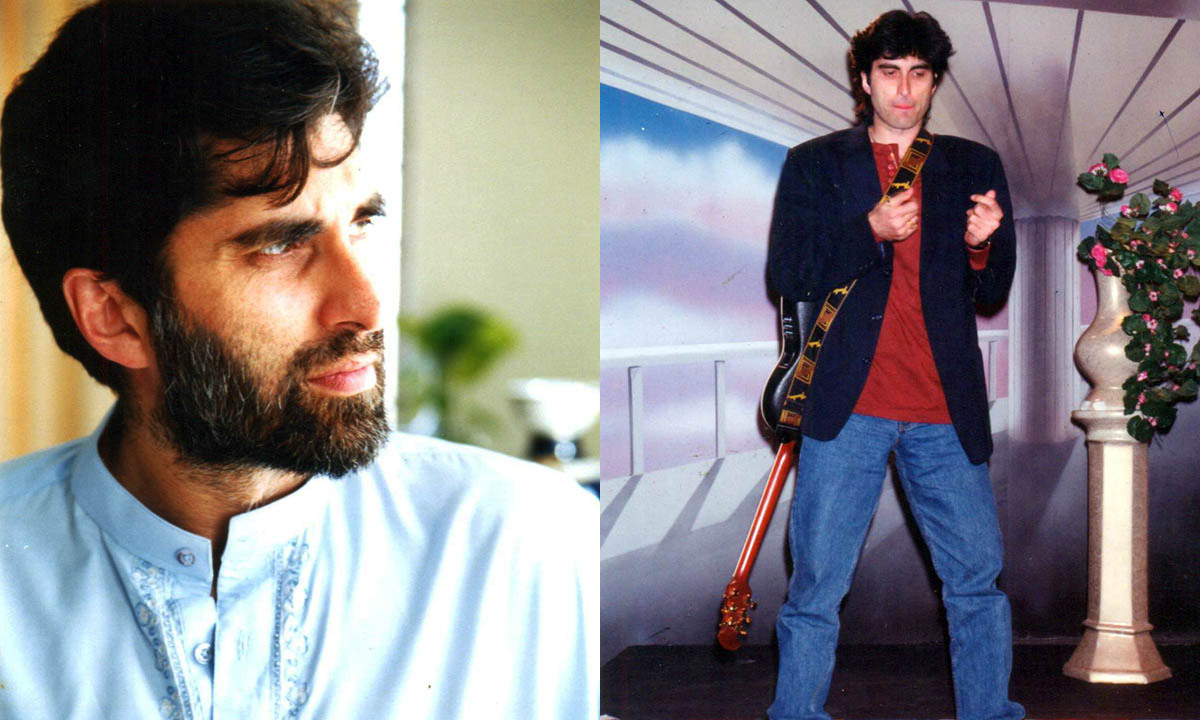A generation remembers Junaid Jamshed as the icon who gave us Dil Dil Pakistan. He started his public life as the beautiful young man in Vital Signs and captured many a young Pakistani women’s hearts during the 1980’s. In his later life, he went on to become a controversial figure owing to his association with namesake clothing chian J. and his transition into becoming a religious scholar. What will never be forgotten is Junaid’s impact on Pakistani consciousness.
His soothing vocals were widely appreciated by one and all
The bassist for Vital Signs Shahzad Hassan once recalled, when they got Junaid onboard the band, “we looked around and then we thought of Junaid, who was in a mediocre band and he was the best part about the band, he was a very good singer and with his good looks and great vocals, was the bona fide front man”.
Soon after Jamshed joined, Vital Signs gained nationwide prominence and international recognition in 1987 with their self-titled album. The album topped the music channel charts around the country. It included the number one single and youth anthem Dil Dil Pakistan, and Tum Mil Gaye. The commercial success of Vital Signs’ first album is credited as having helped develop Pakistan’s rock music industry.
As part of Vital Signs, Jamsed gave numerous hits including Aietbar, Sanwali Saloni, Woh Kaun Thi and their last single Maula. After their last single, the group’s bassist Shahzad, left for the US with a job at IBM and keyboardist Rohail Hyatt went on to launch Coke Studio.
During this time Junaid Jamshed also delved into acting with the PTV miniseries Dhundle Rastay.
In 1994, Junaid embarked on his solo career, releasing his debut album “Junaid Of Vital Signs”
Junaid of Vital Signs, which also quickly became a national hit, was followed by Us Rah Par in 1999 and Dil Ki Baat in 2002. As part of a widely successful solo career, Jamshed had several hits to his credit and released his last solo album in 2001 – Dil Ki Baat.
After his last album, in 2001, Junaid Jamshed disappeard from public life
It is speculated that he struggled during this time because his last album did not do as well, financially, until his mentor from earlier in his life, Shoaib Mansoor gave him a role in the 1999 TV show Gulls & Guys, on PTV.
September 11, 2001 proved to be a pivotal time for Junaid because of complications during his travels to the West. The questions, changing attitudes of people abroad and increasing suspicion about Pakistan and Pakistanis in the rest of the world affected Jamshed quite severely. He filed for bankruptcy during this time, as he had shunned his career in entertainment.

In 2012, Shoaib Mansoor said that his famous movie Khuda Kay Liye was inspired by Junaid Jamshed’s life
In 2004, Jamshed officially renounced music after announcing that he had devoted his life to religious causes. Jamshed then also left his career in engineering and, to supplement his income, he opened the clothing store “J.”. In 2007, in an interview in a magazine, his mentor Shoaib Mansoor admitted that he was badly affected when Jamshed turned away from music:
“One morning I was going through a newspaper when I saw my friend Junaid Jamshed’s interview in it. After looking at his new attire in the photograph, published with the article, I could not stop myself from reading it. The more I read the sadder I felt. He had announced that he was quitting music after being convinced that it was ‘Haram’. It really shook me badly. I have never believed that God could hate the two most beautiful things he has given to mankind—music and painting. I felt that a confused man like Junaid had no right to confuse thousands of his youthful followers. I had given him sixteen years of my life as a true friend and had played my role in his professional life to the best of my abilities. How could he throw away our sixteen years just like that without even consulting me? I feel that it was my duty to rectify the damage he has done to the already suffering society under the influence of fundamentalists.”
In 2014, Junaid Jamshed acknowledged that he does not “hate” his past
Despite public opinion, and Jasmhed’s statements to the contrary, he tweeted in 2014 that he acknowledges his singing career and that is how he got a platform to be able to do what he did, later on life.
I don't hate my past . Though I give that impression . I m Dil Dil Pakistan forever .
— Junaid Jamshed (@JunaidJamshedPK) August 10, 2014
His debut religious album, Jalwa-e-Janan was released in 2005 and was followed by Mehboob-e-Yazdaan in 2006, Badr-ud-Duja in 2008, and Badee-uz-Zaman in 2009.
Despite his conservative public appearance later on, his life hadn’t been without controversy
In 2014, he was accused of blasphemy by TV personality Dr. Aamir Liaquat. After a lot of controversy, Junaid Jamshed issued a public apology message clarifying his intentions.
com.jpg)
On the fateful PIA flight, Junaid was accompanied by his wife Nayha, and they were returning from Chitral
After the plane was reported to have crashed in Havelian, near Abbotabad, and Junaid’s name was released as part of the victims of plane crash, many took to social media to express their condolences to the family.
PK-661 departed from Chitral at 3:30pm and disappeared from the air control radar soon after take off. There were 47 people, including 5 crew members on board the aircraft.
Junaid, you were an icon. You were controversial, yet you were always relevant. You may have left but you shall not be forgotten.
Cover image via: wmsmedia.co.uk





